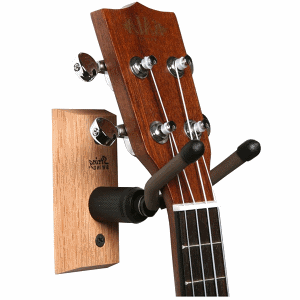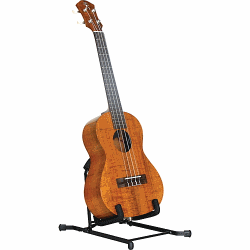So you bought a new expensive ukulele, but now your wondering how to best store it to have it sounding beautifully for years to come?
Or maybe your looking for ideas to show-off your new ukulele with a wall-hanger or a stand to display your ukulele on the floor or a shelf?
Either way, this article is for you.
Protecting Your Ukulele In Storage
If you’re looking to keep your ukulele safe while stored, the three primary factors you must watch out for are humidity, temperature, and people/pets.
Protecting Your Ukulele from Humidity
Wood is like a sponge. When it gets dry, the loss of absorbed moisture creates a loss of mass and it shrinks. When it gets humid, the excess absorbed moisture creates excess mass and it expands.
Chances are pretty good your ukulele is made of wood — not just any wood either. The thin, delicate sheets of wood used in ukulele making have lots of surface area relative to their mass, which makes them very good at absorbing and losing moisture.
Short-term, slight humidity imbalances might only change the sound of your uke, but long-term/extreme imbalances can cause warping, cracks and breaks.
If you own a high-end wooden ukulele (or a low-end one you just really really like) you might consider monitoring and controlling the humidity you store it in.
First figure out what the humidity of your ukulele’s case (or wherever it’s stored) is with a hygrometer. The ideal humidity for solid wood ukuleles is around 45% relative humidity (relative to room temperature), but variations of 5% or so shouldn’t cause any major problems.
If there’s too little humidity, consider moving your uke to a more humid location in your house, like the basement, or investing in a humidifier.
If there’s too much humidity, consider moving your uke to a less humid location, like out of the basement, or investing in a dehumidifier. Also if you’re storing your ukulele in its case and the case holds too much humidity, consider storing it on a stand or hanging it on the wall.
Protecting Your Ukulele From Extreme Temperatures
Avoid exposing your ukulele to extremes in temperature either. Too much heat can melt the glues that bind your ukulele together, and too much cold can dry out your uke.
Don’t leave your uke in the car on hot or cold days. Don’t store it in a hot or cold room or near appliances that expel hot or cold air.
Generally, keep it stored in a room where you’d be comfortable sitting, and it should be ok.
Protecting Your Ukulele from People & Pets
People and Pets can cause serious damage. Whether it be dropping, knocking over, or chewing, no ukulele is truly safe.

The only real way to protect your ukulele from these hostile threats is to either keep people and pets away from your uke, or keep your uke away from them.
Keep your uke displayed in a room where clumsy people and pets do not frequently go, or store it away in a hard case to protect it. Either way, stay vigilant!
Displaying in Your Ukulele
Using a Wall Hanger to Wall-Mount Your Ukulele

This is my preferred way to display a ukulele. The uke is kept off the floor and away from the aforementioned pets (as well as short people, the most dangerous of all), while being easily seen and enjoyed for the visual aesthetics of the instrument.
Mount your instrument around eye-level for the best view and decorative effect.
Using a Ukulele Stand to Display Your Ukulele on a Floor or Shelf
Another option is a ukulele stand which is a device which allows the ukulele to be displayed on a horizontal surface (generally a floor or shelf) while holding the ukulele upright.

I usually prefer a displayed ukulele be wall-mounted rather than stood on the floor or shelf for three reasons:
- Wall-mounted ukes are less likely to be knocked over.
- Wall-mounted ukuleles are easier to clean around as dust generally collects on horizontal surfaces (floors and shelves).
- I prefer the “look” of a wall-mounted display.
That’s all for this article. Hopefully it helped you make the best decision on how you will store and display your new uke.
Good luck and happy strumming!
